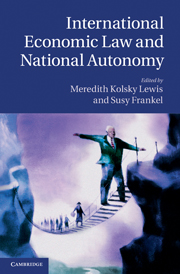Book contents
- Frontmatter
- Contents
- Notes on contributors
- Acknowledgements
- Introduction
- PART I International economic law: conceptions of convergence and divergence
- 1 The end of the globalization debate: continued
- 2 Global economic institutions and the autonomy of development policy: a pluralist approach
- 3 Fragmentation, openness and hegemony: adjudication and the WTO
- PART II WTO treaty interpretation: implications and consequences
- PART III Responding to international economic law commitments
- PART IV Transformations in international economic law
- Index
- References
1 - The end of the globalization debate: continued
from PART I - International economic law: conceptions of convergence and divergence
Published online by Cambridge University Press: 10 January 2011
- Frontmatter
- Contents
- Notes on contributors
- Acknowledgements
- Introduction
- PART I International economic law: conceptions of convergence and divergence
- 1 The end of the globalization debate: continued
- 2 Global economic institutions and the autonomy of development policy: a pluralist approach
- 3 Fragmentation, openness and hegemony: adjudication and the WTO
- PART II WTO treaty interpretation: implications and consequences
- PART III Responding to international economic law commitments
- PART IV Transformations in international economic law
- Index
- References
Summary
Introduction
This brief essay pursues a line of argument that I deployed in a review article in the Harvard Law Review, discussing several important recent books about globalization. The thesis is that there is no longer a meaningful or important debate for or against globalization because the anti-globalizers have themselves gone global. In various sites of global law and policy-making, including those at the interstices of the global and local (as will be explained), the anti-globalizers actually found processes and institutions where, unlike the case with the ‘state’ in many instances, they could air their criticisms of policies and express their values as global values. Despite the continuing rhetoric and polemics regarding the promotion of globalization, there is no longer an anti-globalization ‘side’ in the debate, coherently representing the position that the territorial nation-state is and should remain the locus of control over economic activity and that it should retain a monopoly on legitimate governance. Today the protesters who march against ‘globalization’ are not marching in favor of the ‘state’. Instead, they are, mostly, advocating a set of values and causes that transcend state boundaries and that require global action. Anthony Giddens anticipated, at the beginning of this century, that the debate would re-focus as a debate about globalization, rather than whether globalization should take place (as I learned after writing my Harvard essay).
- Type
- Chapter
- Information
- International Economic Law and National Autonomy , pp. 7 - 21Publisher: Cambridge University PressPrint publication year: 2010
References
- 2
- Cited by



